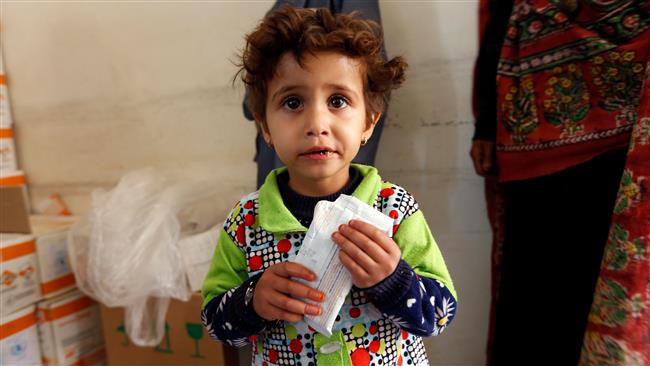
RNA - Jamie McGoldrick, the UN Humanitarian Coordinator for Yemen, raised the alarm on Monday, adding that though a Saudi-imposed crippling blockade had been slightly eased the situation in the Arab country remained dire.
“The continuing blockade of ports is limiting supplies of fuel, food and medicines; dramatically increasing the number of vulnerable people who need help,” he said in a statement.
On November 6, Saudi Arabia announced that it was shutting down Yemen’s air, sea, and land borders, after Yemeni fighters targeted an international airport near the Saudi capital of Riyadh with a cruise missile in retaliation for Saudi’s devastating aerial bombardment campaign against Yemen.
The crippling blockade has exerted further pressure on Yemeni people, who receive desperately needed humanitarian assistance through the western port city of Hudaydah and an international airport in the capital Sana’a, both under the tight siege.
The world body has already made a plea for the so-called coalition to lift its blockade, warning that without aid shipments “untold thousands of innocent victims, among them many children, will die” and that its partial lifting was not enough.
“The lives of millions of people, including 8.4 million Yemenis who are a step away from famine, hinge on our ability to continue our operations and to provide health, safe water, food, shelter and nutrition support,” McGoldrick added.
The figure provided by the UN official marked an increase from past UN estimates of around 8 million people on the verge of famine.
The Saudi war machine, propelled by a constant flow of US and UK arms supplies, spearheads a military campaign that has been incessantly pounding Yemen since March 2015 in an attempt to crush the popular Houthi Ansarullah movement and reinstate the former president, Abd Rabbuh Mansur Hadi, a staunch ally of the regime in Riyadh.
According to latest figures, the war has so far killed over 12,000 Yemenis and wounded thousands more. The Saudi aggression has also taken a heavy toll on the country's facilities and infrastructure, destroying many hospitals, schools, and factories.
The World Health Organization figures show that around 960,000 suspected cases of cholera and 2,219 deaths have been documented since the deadly epidemic broke out in April in the impoverished country, where 8 million people also face war-triggered famine.
847/940